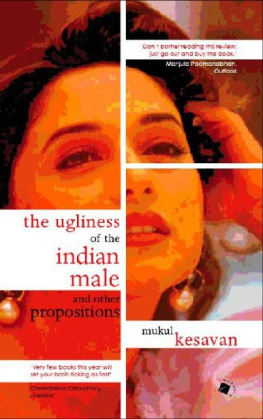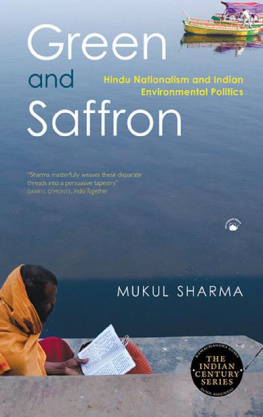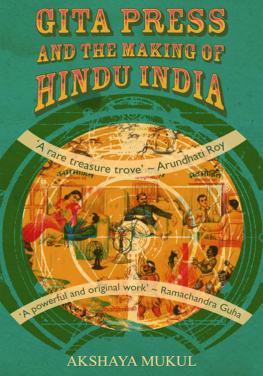Homeless
on Google Earth
For our entire range of books please use search strings "Orient BlackSwan", "Universities Press India" and "Permanent Black" in store.
Also by Mukul Kesavan
LOOKING THROUGH GLASS
SECULAR COMMON SENSE
THE UGLINESS OF THE INDIAN MALE AND OTHER PROPOSITIONS
MEN IN WHITE
Homeless
on Google Earth
Mukul Kesavan
Published by
PERMANENT BLACK
Himalayana, Mall Road, Ranikhet Cantt,
Ranikhet 263645
Distributed by
Orient Blackswan Private Limited
Registered Office
3-6-752 Himayatnagar, Hyderabad 500 029 (A.P.), INDIA
e-mail:
Other Offices
Bangalore, Bhopal, Bhubaneshwar, Chennai,
Ernakulam, Guwahati, Hyderabad, Jaipur, Kolkata,
Lucknow, Mumbai, New Delhi, Noida, Patna
Copyright 2014 Mukul Kesavan
eISBN 978 81 7824 431 0
e-edition:First Published 2013
ePUB Conversion: .
All rights reserved. No part of this publication may be reproduced, distributed, or transmitted in any form or by any means, including photocopying, recording, or other electronic or mechanical methods, without the prior written permission of the publisher, except in the case of brief quotations embodied in critical reviews and certain other noncommercial uses permitted by copyright law. For permission requests write to the publisher.
For
RAGHU AND TARA
Contents
| 1 |
| 2 |
| 3 |
| 4 |
| 5 |
| 6 |
| 7 |
| 8 |
| 9 |
| 10 |
| 11 |
| 12 |
| 13 |
| 14 |
| 15 |
| 16 |
| 17 |
| 18 |
| 19 |
| 20 |
| 21 |
| 22 |
| 23 |
| 24 |
| 25 |
| 26 |
| 27 |
| 28 |
| 29 |
| 30 |
| 31 |
| 32 |
| 33 |
| 34 |
| 35 |
| 36 |
| 37 |
| 38 |
| 39 |
| 40 |
| 41 |
| 42 |
| 43 |
| 44 |
| 45 |
| 46 |
| 47 |
| 48 |
| 49 |
| 50 |
| 51 |
| 52 |
| 53 |
| 54 |
| 55 |
| 56 |
| 57 |
| 58 |
Preface, or, The Intelligent Indians Guide to Virtuous Opinion
The pundits home is the newspaper column
(Which holds up nothing in spite of its name).
The pundits tone is generally solemn
But the form itself is a kind of game.
Columnists always have a persona,
A flexible I thats also a brand,
It flits at will from Derrida to Drona,
Prances, provokes, draws a line in the sand.
Grandmasters of rage, of frictionless feeling,
Forensic experts who choose their own facts,
Snobs who switch to hearty plain dealing,
Mandarins who slum as auto-didacts;
So-subtle liberals who fight Rams battles,
Free-thinking lions who finger free speech,
Comrades now counted as Modis rattles,
For all these, each column is Omaha beach.
Not all op-ed writers are crooked and rotten
Some (me included) are forthright, direct;
Our virtues secret, often forgotten,
Lies in our being politically correct.
Say after me now, India is various,
Difference is good, killing people is wrong,
Reservations fair, Hindutva is carious,
Mind your own business, well all get along.
Acknowledgements
The pieces in this collection were first published in newspapers, magazines, and books, sometimes in slightly different versions and often with other titles.
In Outlook Traveller : Consuming Wildness in Kruger; Goa Thirty Years After.
In Outlook : No Place Like Home; One Hundred Years of Bollytude; Dharmendra, the Bhadralok Jat; Azharuddin in Moradabad; 1984.
In Mint : The Anglophone; Farhan, Irrfan, and Bombays Newish Cinema; Re-imagining Rain; Wikileaks, Facebook and the End of Privacy; Operation Green Hunt.
In Biblio : Confessions of a Self-Hating Jew; The Past in Its Own Voice.
In Women Changing India, edited by Urvashi Butalia and Anita Roy: Hasina Sheikh, Taxi Driver (New Delhi: Zubaan, 2010).
In AIDS Sutra: Untold Stories from India, edited by Negar Akhavi: Nowhere to Call Home, or Men Who Have Sex With Men (New Delhi: Random House, 2008).
In the India International Centre Quarterly: Bad Manners, or, Wasnt Pakistan a Mistake? (vol. 35, no. 3, 4 , Winter 2008Spring 2009).
The rest were first published in The Telegraph, Calcutta.
The Unimportance of Belonging
No Place Like Home
When I was 7 or 8, I asked my father where I was from. Or what we were, which seemed, then, to amount to the same thing. My father told me that I was a Kannadiga and that we were from Mysore, the name by which Karnataka was known in 1965. At the time I was a schoolboy in Delhi so the information was useful; "where are you from?" was the first question you were asked in class. The second question, but second only by a short head, was "what does your father do?"
My father was a librarian and his "native place" was contained, theoretically at least, within his name. South Indians (or Madrasis as they were known in Delhi in the 1960s) often had two initials before their names: the first indicated a place name, the second was often the father's name. So B.S. Kesavan expanded into Bellary Shamanna Kesavan, which made me a Kannadiga from Mysore, and if a classmate wanted me to get more specific I could even supply an ancestral place name.
Only it wasn't as cut and dried as it sounded. My father, despite his name, felt no sense of belonging to Bellary. The name was an affectation, a lie: an ancestor who had achieved petty government rank had decided that it was grander to claim Bellary, a district capital, as home, rather than the obscure place to which he belonged, a tiny town called Bindignavale. When, towards the end of his life, he felt the need to return to his origins, my father led a little cavalcade of cars filled with members of his extended family to Bindignavale where his ancestors had endowed a temple.
But even Bindignavale wasn't where he (or I) began. There lurked a pre-Kannadiga identity and the clue to it lay in the fact that my father spoke Tamil fluently, as did his brothers. Some ten years ago, I visited my uncle in Bangalore and found him in a rage. A militantly nativist movement had begun to attack "outsiders" in Bangalore, specially Tamilians, allegedly because they didn't identify with Karnataka's language, Kannada, and continued to speak Tamil. My uncle, who like his brother thought of himself as a Kannadiga and spoke Kannada like a native, was infuriated that arriviste politicians had declared that people with names like Kesavan and Natarajan were enemy aliens. "Kannada! I'll teach these fellows Kannada!" he growled, his moustache bristling.
The language my father and his brothers grew up speaking at home was a dialect of Tamil because, many generations earlier, their ancestors had migrated from the Tamil country to present-day Karnataka, following their spiritual preceptor, Ramanujacharya. Their descendantsB.S. Kesavan and his brothers amongst themspoke pidgin Tamil within the family and Kannada to the outside world. This didn't make them linguists, it made them liminal: "real" Tamils thought they were inadequately Tamil while militant Kannada activists refused to see them as authentically Kannadiga.
Next page










